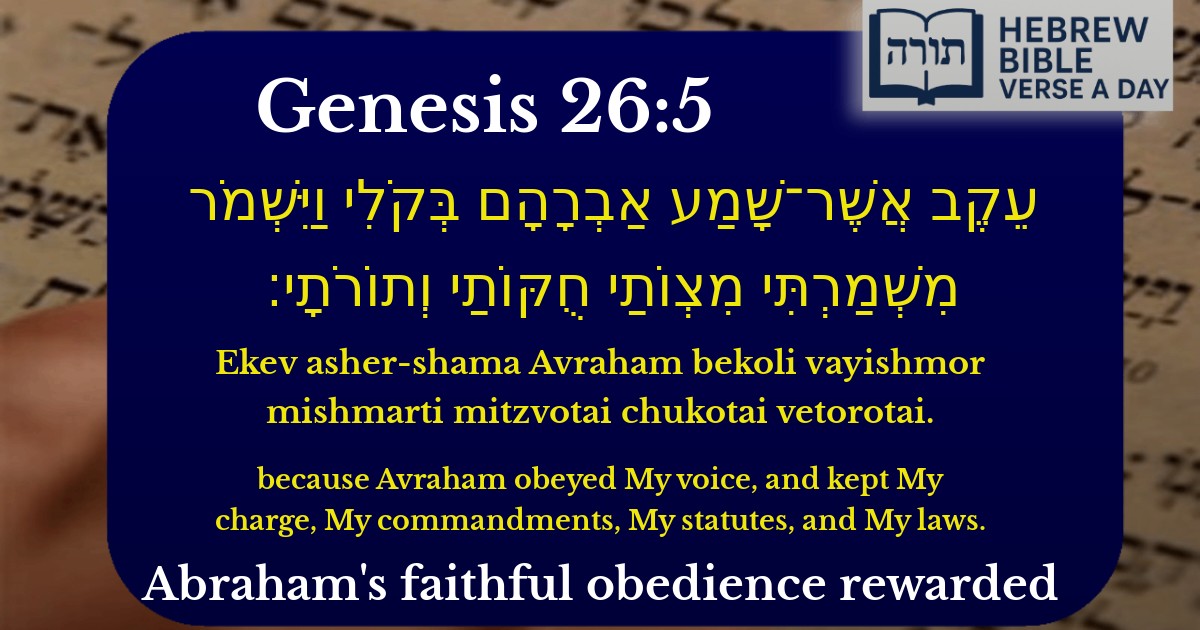Join Our Newsletter To Be Informed When New Videos Are Posted
Join the thousands of fellow Studends who rely on our videos to learn how to read the bible in Hebrew for free!
Hebrew Text
עֵקֶב אֲשֶׁר־שָׁמַע אַבְרָהָם בְּקֹלִי וַיִּשְׁמֹר מִשְׁמַרְתִּי מִצְוֺתַי חֻקּוֹתַי וְתוֹרֹתָי׃
English Translation
because Avraham obeyed My voice, and kept My charge, My commandments, My statutes, and My laws.
Transliteration
Ekev asher-shama Avraham bekoli vayishmor mishmarti mitzvotai chukotai vetorotai.
Hebrew Leining Text
עֵ֕קֶב אֲשֶׁר־שָׁמַ֥ע אַבְרָהָ֖ם בְּקֹלִ֑י וַיִּשְׁמֹר֙ מִשְׁמַרְתִּ֔י מִצְוֺתַ֖י חֻקּוֹתַ֥י וְתוֹרֹתָֽי׃
עֵ֕קֶב אֲשֶׁר־שָׁמַ֥ע אַבְרָהָ֖ם בְּקֹלִ֑י וַיִּשְׁמֹר֙ מִשְׁמַרְתִּ֔י מִצְוֺתַ֖י חֻקּוֹתַ֥י וְתוֹרֹתָֽי׃
🎵 Listen to leining
Parasha Commentary
📚 Talmud Citations
This verse is quoted in the Talmud.
📖 Yoma 28b
The verse is cited to demonstrate that Abraham observed the entire Torah even before it was given, including the commandments, statutes, and laws.


The Meaning of "עֵקֶב אֲשֶׁר־שָׁמַע אַבְרָהָם"
Rashi explains that the word "עֵקֶב" (translated as "because") alludes to the concept of reward for mitzvot that may seem minor or like "heel" (עֵקֶב) in comparison to others. Avraham Avinu's unwavering commitment to Hashem's will, even in seemingly small matters, earned him this divine recognition.
Avraham's Obedience: "שָׁמַע בְּקֹלִי"
The phrase "שָׁמַע בְּקֹלִי" ("obeyed My voice") refers to Avraham's readiness to follow Hashem's commands without hesitation. The Rambam (Hilchot Avodah Zarah 1:3) highlights that Avraham recognized Hashem through intellectual inquiry but ultimately submitted to divine commandments with complete faith. This is exemplified by the Akeidah (Binding of Yitzchak), where Avraham demonstrated ultimate obedience.
The Layers of Divine Commandments
The verse enumerates four categories of Avraham's observance:
Avraham's Pre-Sinai Observance
The Talmud (Yoma 28b) teaches that Avraham fulfilled the entire Torah, including rabbinic enactments, through divine inspiration. The Sforno adds that Avraham internalized Hashem's teachings so deeply that they became his own "Torah," guiding his every action.
The Reward of Continuity
According to the Kli Yakar, the verse emphasizes that Avraham's merit was not just in performing mitzvot, but in transmitting this legacy to his descendants. His obedience ensured the eternal covenant with the Jewish people, as the next verse (Genesis 26:5) transitions to the promise given to Yitzchak.